Stress can create difficulties in an individual of any age group and if untreated can cause fatal heart problems.
Stress is a common part of life, but did you know it could ruin your heart? You could be getting the jitters from exams, work pressure, or something personal, and stress, in turn, makes you get drenched in sweat, beat your heart faster than usual, and lose your focus. Short-term stress is just what you need to keep your eyes on the ball, but long-term stress can be tireless, such as high blood pressure, disturbances in cardiac rhythm, or even heart attacks.
Most people think that heart disease is only an issue for the old folks, but that is a fallacy. Stress can create difficulties in an individual of any age group and if untreated can cause fatal heart problems. Dr. Chetan Rathi, a reputable cardiologist in Nagpur, posts, as his main topic, the notion that stress management is the way for not only taking care of your heart in the long term but also for taking care of your family.
Now let’s find out how stress impacts your heart and what measures you can take to guard it.
What Is Stress?
Stress is the body's reaction to pressure, dispute, or source of danger. It serves the purpose of secretion of certain hormones such as adrenaline and cortisol, making you ready to run away and fight (often called the 'fight or flight' trigger). Your heart beats faster, blood pressure shoots up. It helps in short bursts, only when you need to run while escaping from danger. But then, too much stress comes often: it becomes a problem.
How Stress Hurts Your Heart
Too much duration of stress can put your heart into work. Here is how it goes:
High Blood Pressure: Stress causes the heart to beat faster. Thus the blood pressure becomes higher. Multiple episodes can harm the blood vessels and boost the danger of heart attacks.
Increased Heart Rate: More often than not, the heart speeds up in challenging situations. Continued episodes might overstress the heart making it prone to complications.
Inflammation: Inflammation can occur as a result of inclusive stress and it can lead to blocked arteries by decreasing the flow of blood to the heart which eventually can be the cause of heart disease or a myocardial infarction.
Unhealthy habits: People usually prefer to eat junk foods and smoke when they are stressed out and often they even do not sleep at all. These things damage heart muscles in the long run.
Signs That Stress Is Affecting Your Heart
How do you know if stress is harming your heart? Here are some signs to watch for:
Your heart races even when you’re resting
You feel dizzy or lightheaded often
You have trouble sleeping
You get frequent headaches
You feel tired all the time
If you experience these symptoms often, it may be time to reduce your stress levels.
How to Protect Your Heart from Stress
The great part about stress is that you can control this situation before it even starts to damage your heart:
Exercise regularly: Whether running, cycling, dancing, or simply walking, your body will create endorphins which are natural stress relievers and make your heart stronger.
Get enough sleep: Our body needs this time to recuperate. Make sure you have 7-9 hours of sleep every night to maintain good heart health.
Eat healthy foods: A diet having a variety of fruits, vegetables, and whole grains not only keeps the heart strong but also prevents the disease.
Practice breathing and meditation exercises: Deep breathing or meditation for a few minutes per day, can lead to a peaceful mind and will not allow stress to take over your mind.
Spend time with friends and family: Just talking could make everyone feel more united and it is likely to lower the stress level in people.
Cut down on watching TV or surfing the net: Too much time spent following things like social media or the news can increase anxiety levels, that's the reason to keep taking breaks and doing fun things in between.
Soak in some music: Soothing music has great effects in relaxing the mind and body. It lowers stress levels quite a lot.
Drink plenty of water: Staying hydrated keeps your body up to par and makes stress easier to deal with
Engage in hobbies: Hobbies, including painting, reading, or even playing a sport, are activities that help take the mind away from stress and keep it happy.
Conclusion
It's a fact that every individual goes through stress while carrying out their daily chores. However, excessive exposure to it could have severe ramifications for the heart, including the possibility of an attack. The mitigation measures adopted in dealing with such stress always lie in the management of such negatively generated habits. In this case, good exercise, correct diet practices, good sleeping habits, and trying to be with people who create happiness around you are recommended. Prevent the unfortunate consequences of stress in your life right now by taking heart care seriously. It will have strong years ahead!
Next time, when you feel stressed out in life, take a moment to hold your breath and tell yourself that your heart also needs some sort of care! In case you need any further assistance, you can even contact Heart Attack Care in Nagpur for a healthy future.
